Ferrets are amazing little creatures that make great pets for a variety of people. However, some potential ferret owners may be wondering if their cats will get along with the new furry family member. In this post, I will take a look at whether ferrets and cats can live together in harmony and provide you with some tips on how to make it work.
There are a lot of myths and rumors about whether or not different types of animals can get along. People love to share their own personal anecdotes, but when it comes down to it, there’s no real answer. Do ferrets get along with cats? The honest answer is: IT DEPENDS!
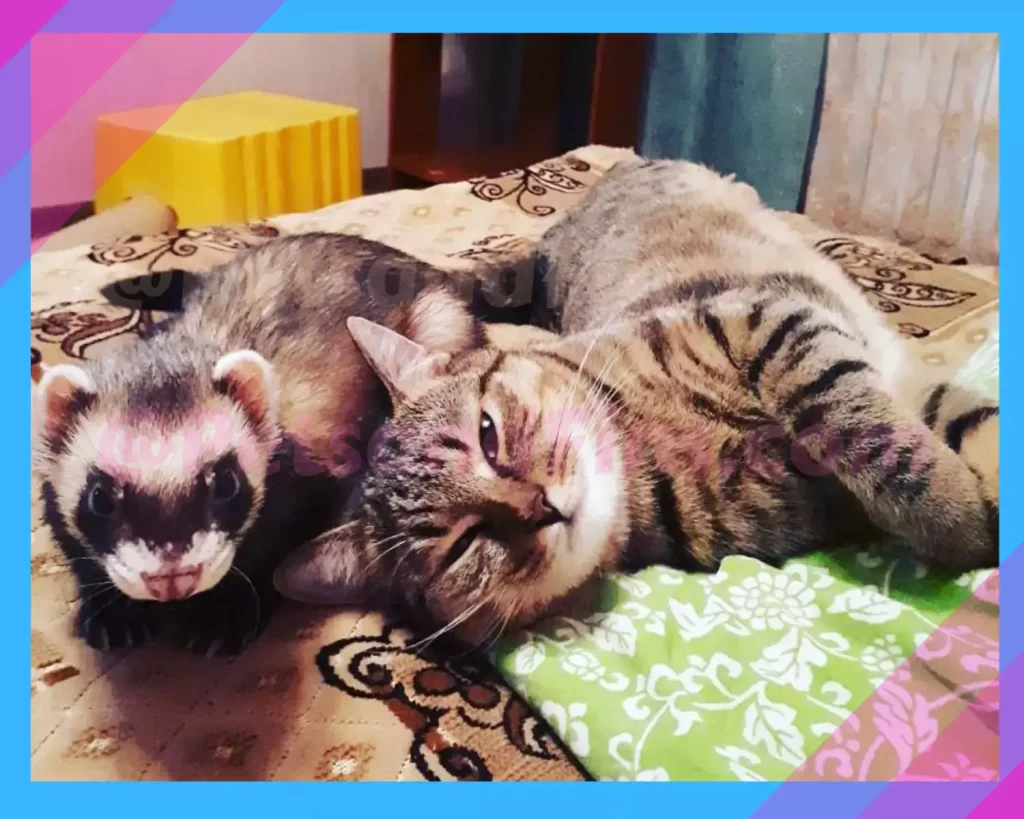
Some people will tell you that their ferret and cat live together in perfect harmony, while others will swear that it’s a disaster waiting to happen. The reality is that, much like in any other relationship, there are going to be some ups and downs. With a little bit of effort and patience, however, you may be able to help your furry friends learn to live together peacefully. Read on for some tips!
For Those Who Already Have A Cat:
So, if you’re considering getting a ferret and you have a feline friend at home, read on!
Whether you’re a first time ferret owner or just curious about the possibility of having both a cat and a ferret in the same household, you’ve probably asked yourself, “Do ferrets get along with cats?”The answer to that question is yes, but there are some things you should know before making the decision to add a ferret to your cat family.
Ferrets and cats are both predators, but that doesn’t mean they can’t live together. In fact, in most cases, they do just fine.
That said, there are a few things you should keep in mind if you want to try to make it work. First of all, ferrets like to play—a lot. And their idea of playing often involves biting and scratching.
Cats don’t usually take kindly to being roughhoused by other animals, no matter how small they may be. So, if your cat has shown signs of aggression towards other animals in the past or seems especially sensitive, it might be best not to introduce a ferret into the home.
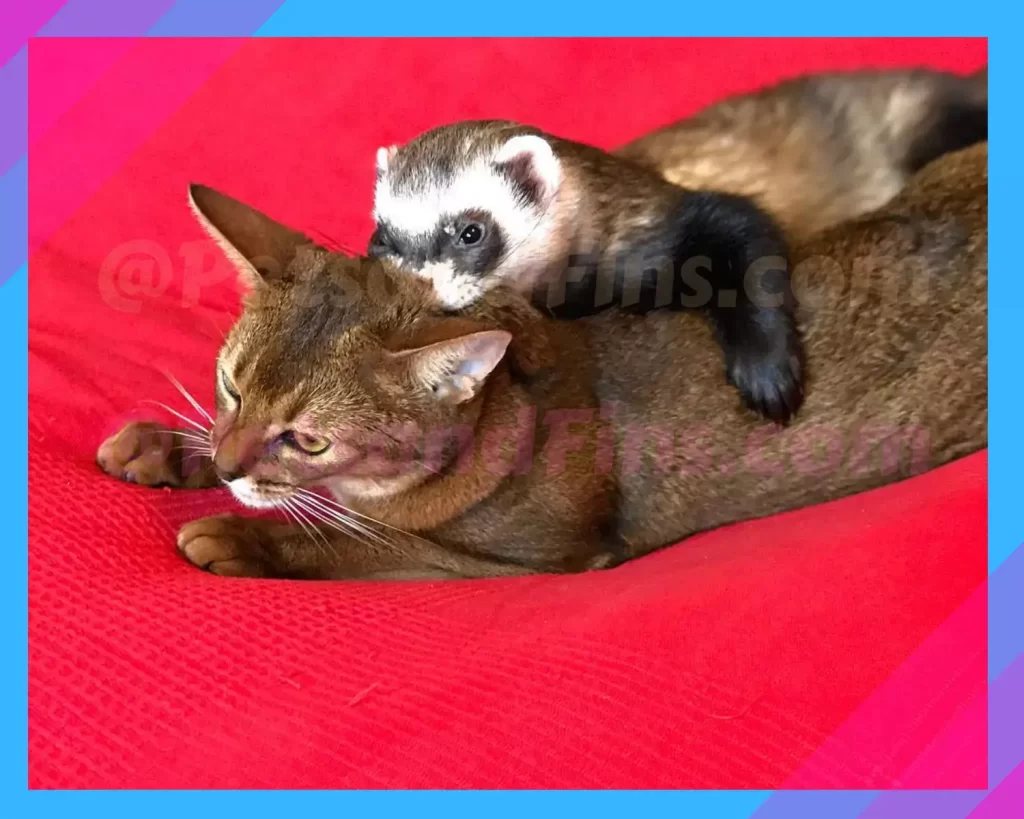
Another thing to consider is that cats have a natural instinct to be solitary hunters. In the wild, most things they encounter are either potential food or predators themselves. So if your cat seems overly aggressive around ferrets, it could be because he feels cornered and his “fight or flight” instincts kick in – which means you might want to think twice about letting him interact with them at all!
The last thing worth mentioning is how long your relationship has been going smoothly between your cat and other pets before adding a new animal into the mix. If there has ever been any sort of behavior issue (for example, excessive marking), introducing another predator like a ferret could cause those problems to surface again as well as lead to fights between animals that may never otherwise have happened.
On the other hand, if everything has been going well and your cat is generally relaxed around other animals, then there’s a good chance he’ll be just fine living with a ferret – after all, they do have a lot in common!

Just like cats like to lounge in high places where they can watch everything happening below them, ferrets also enjoy having a lookout spot. A tall cat tree or scratching post will give your ferret somewhere safe to perch while keeping an eye on his new feline friend.
And since both animals love to play, provide some toys that are specifically designed for each of them (a set of ping pong balls is always popular with both species) and set aside some time each day for each of them to enjoy playing.
At the end of the day, whether or not you decide to add a ferret to your family is up to you. But by keeping in mind the things I’ve mentioned, you can at least make sure that if you do choose to bring a ferret into your home, both he and your cat will have as much fun as possible!

For Those Who Already Own A Ferret:
If you’re the proud parent of a ferret and are thinking about adding a cat to the family, congratulations! You’re in for some fun times.
Just like there are things to keep in mind if you already have a cat at home and are considering getting a ferret, there are also a few things to think about if you’re bringing a new feline friend into your ferret-filled home.
First of all, remember that cats and ferrets are both predators, and as such, they should never be left unsupervised together. Ferrets may see the cat as a potential threat , while cats may view the little ferret as nothing more than an annoyance – or worse, a threat.
Second, like I mentioned previously, ferrets will play rough with each other. Do you really want your cat to get hurt? If so, then it might not be a good idea to introduce them just yet! And while the average size of the feline species means that they’re less likely than smaller animals to become prey to their larger cousins, accidents can happen and injuries do sometimes occur.

So if your little ferret is acting too rambunctious around kitty or doesn’t seem to know what his own strength is by this point in time (which should already be evident), consider temporarily separating him from the cat until he learns how to be gentler when playing.
However, if you already have a ferret at home and it’s been long enough since he was last “introduced” to other animals (for example, the cat that used to live in your yard or neighborhood), then there’s probably no need for concern. Ferrets are really good at getting along with others, especially when they get plenty of play time together!
And finally, pay attention to how both animals behave around each other. Do they seem comfortable? Do they like playing together? Does either of them ever show any signs of aggression towards one another? If so, separate them immediately before things escalate into something worse than just harmless roughhousing! And remember that even if everything seems fine now, things can change in a heartbeat.

Introducing Both When Young Helps:
It’s probably best to introduce your ferret and your cat when they are both young. This way, their first meeting will be less stressful for everyone involved because neither animal has established a habit of behaving aggressively towards the other.
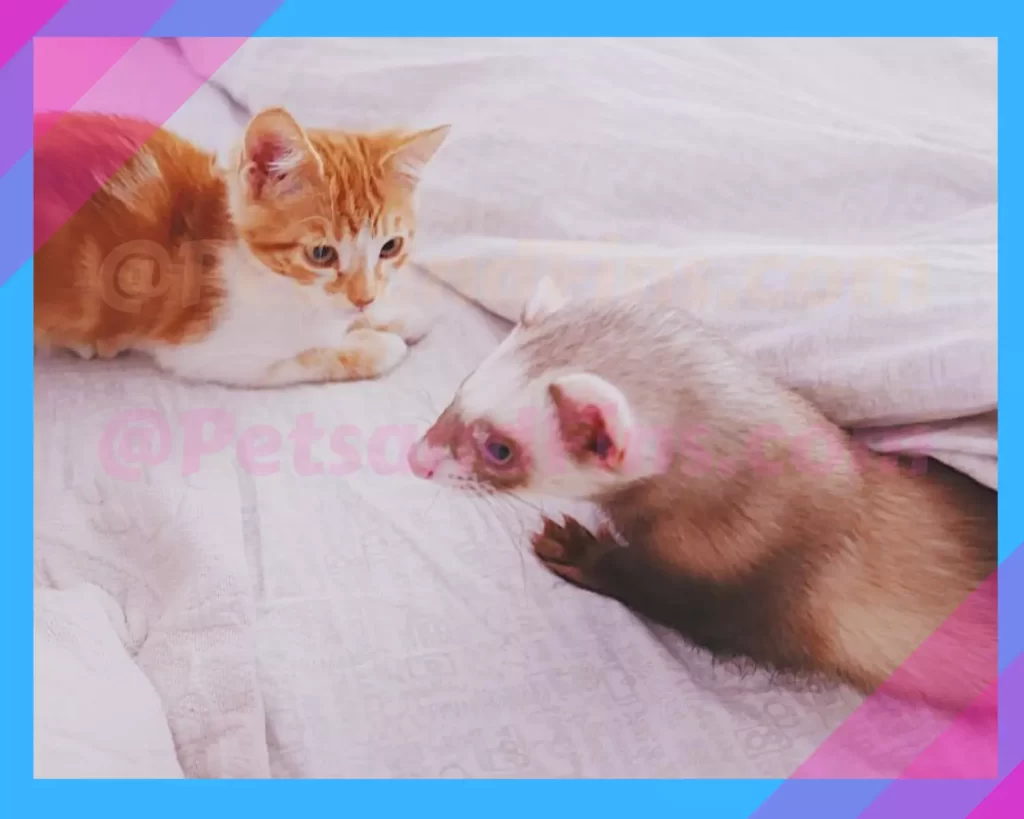
Then again, if you adopt an older cat or bring home an adult feline after having had a ferret for years, that doesn’t mean things won’t work out! It just means it may take longer before they become friends, but with some patience on your part, chances are good that eventually they’ll hit it off.
After all is said and done, though, remember this important point: do not force the animals together in any kind of manner! If at any point in time, they seem agitated or feel threatened by each other’s presence, separate them right away. Do not try to “play matchmaker” between your cat and ferret!

Similarities Between Ferrets And Cats:
There are many similarities between cats and ferrets. Do you know what they are?
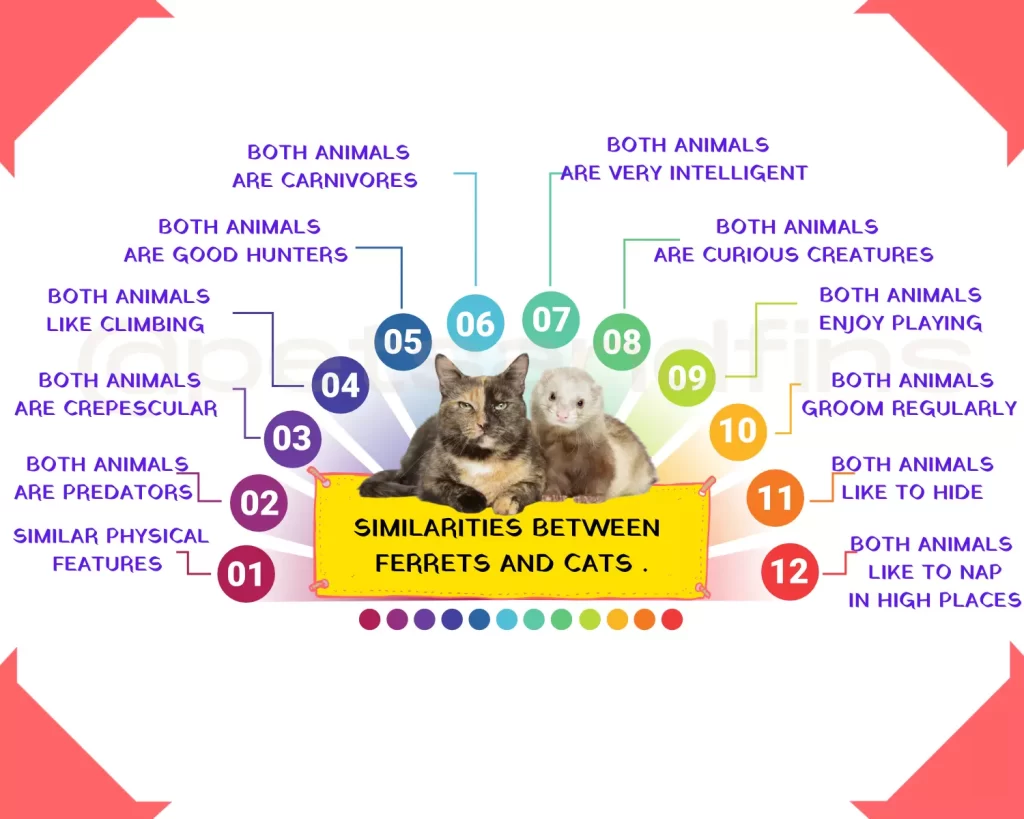
- Similar Physical Features:
Both animals have similar physical features, such as sharp claws for scratching, eyes that work better in the dark than ours do , tails that aid with balance and quick movement, and sensitive whiskers on their faces that help them feel around obstacles when they’re exploring new territory.
- Both Animals Are Predators:
Both cats and ferrets are predators, which means they both have the ability to kill other animals. This doesn’t mean that your cat will automatically go after your ferret – or vice versa – but it is something to be aware of.
- Both Animals Are Crepuscular (meaning they’re most active at dawn and dusk):
This means that if you’re up and about during those times of the day, there’s a good chance you’ll see your cat or ferret out and about playing, exploring, and just generally being active.
- Both Animals Like Climbing:
Cats like climbing to high places where they can watch over their territory from a safe spot, while ferrets love climbing because it allows them to get closer to their prey.
- Ferrets And Cats Are Good At Hunting:
As I mentioned before, both cats and ferrets are natural hunters. This doesn’t mean that your pet will automatically start hunting down house pets, but it is something to be aware of.
- Both Animals Are Carnivores:
Which means they both eat mostly meat. This doesn’t mean that your cat will only eat raw chicken or steak, but it does give them a natural inclination towards hunting small prey.
- Both Animals Have A High Level Of Intelligence:
This is definitely something to be aware of if you’re considering introducing a ferret into your home. Both animals are incredibly intelligent and can easily learn how to open doors, get into cabinets, and steal food when they’re not supposed to. They can also be quite mischievous, so if you’re not prepared for that, then maybe reconsider bringing a ferret into your home!
- Both Animals Are Very Curious Creatures:
Both ferrets and cats are very curious creatures, which means they’re always exploring their environment and learning about everything around them. This is a good thing when it comes to cats because it helps them stay aware of any potential threats, but it can also be dangerous for ferrets since they sometimes explore by climbing up on things that they shouldn’t – like electrical cords.
- Both Animals Enjoy Playing:
One of the best things about having a ferret and a cat in the same home is that they both love to play! This can help keep them occupied and out of trouble, and it’s also a lot of fun for us humans to watch.
Some Of The Games They Like To Play Include:
– Chase: One animal chases after the other until one of them gets tired.
– Hunt And Prey: One animal acts as the hunter while the other tries to avoid being caught.
– Fetch: Similar to playing catch with a ball, only with toys that are designed specifically for cats or ferrets.
- Both Animals Groom Themselves Regularly :
Both cats and ferrets groom themselves regularly in order to keep clean. This means that you don’t usually need to bathe them unless there’s something specific that needs cleaning (like getting rid of an oil or paint spill on their fur, for example).
Just like cats, ferrets groom themselves regularly in order to keep their coat clean and healthy. This is an important part of their daily routine, and if you don’t provide them with a place to do it, then they will most likely take care of business on your carpets or furniture.
- Both Animals Like To Hide:
Both animals like to hide when they feel scared or threatened. This can be dangerous for ferrets since they may try to hide in inappropriate places, like behind the refrigerator, where they could get squished.
- Both Animals Like Napping In High Places:
As I mentioned before, cats love napping in high places where they can watch over their territory. Ferrets also enjoy taking naps in high places, but for a different reason: they do it so they can keep an eye on everything going on around them.
And those are just some of the similarities between cats and ferrets, – both of which should be taken into consideration before deciding whether or not to introduce them to each other. As with any new pet, it’s important to do your research beforehand and make sure that everyone in the household is on board with the idea!
Do keep in mind, though, that just because they have a lot in common doesn’t mean they always get along – it’s important to take things slow and be patient when introducing them to one another!

Steps To Introduce Ferret To A Cat For The First Time:
Slowly Introduce The Cat To The Ferret In A Cage:
You might want to consider keeping the ferret in a separate cage when you first introduce them so that it’s easier for both animals to get used to each other.
The cat should be allowed to approach the cage and look inside, but not get close enough where they can touch or attack one another just yet. Do this for several days until there is no more aggression from either animal towards one another.
Do not leave them alone together during this period of time!
Keep Both Animals On A Leash And Let Them Start Interacting:
Now that the animals have gotten used to each other’s presence, it’s time to start letting them interact a little bit more. This can be done by keeping them both on leashes and slowly allowing them to get closer and closer to each other until they’re finally allowed to roam around freely together.
Again, do not leave them alone together during this process!
It may take a while for them to become best friends, but with patience and careful supervision, they will eventually learn to live peacefully together. And who knows – maybe they’ll even end up becoming good buddies!
Monitor Them Continously:
When they’ve been introduced properly and are no longer fighting with one another, you can start monitoring them more closely. Do this by keeping an eye on them while they play together to make sure that there is still peace between the two animals!
Even if it seems like everything has gone smoothly thus far, do not leave your ferret alone with your cat for too long at a time – just in case something happens.
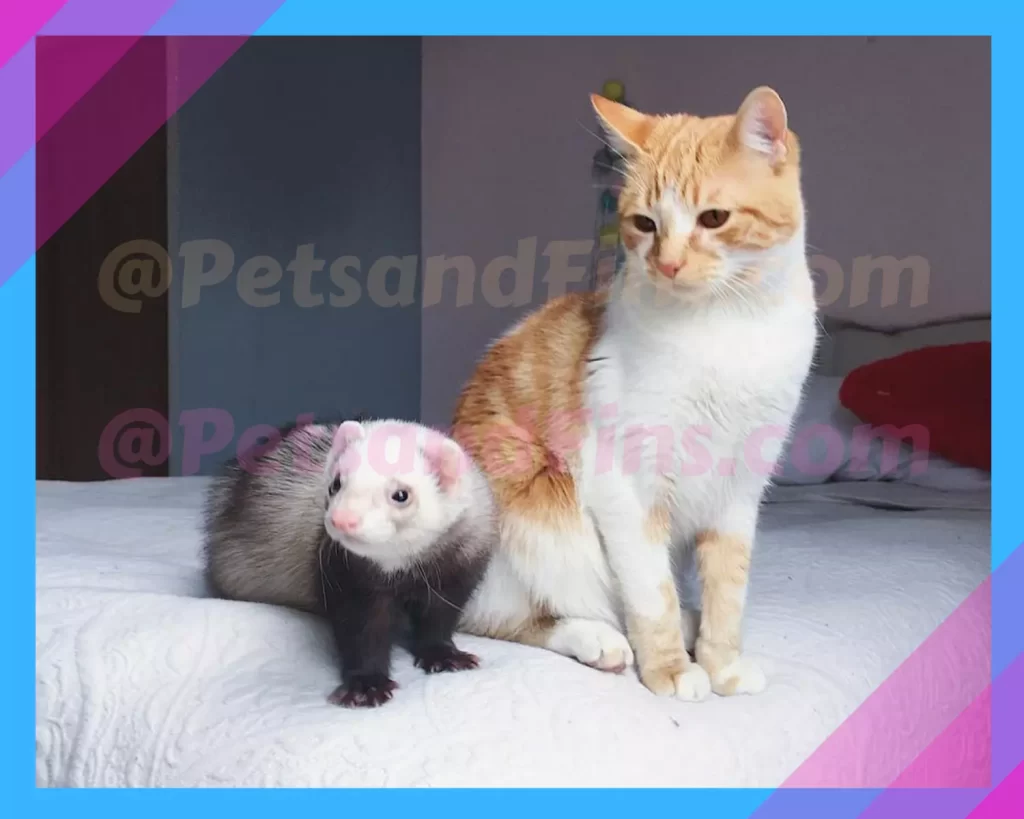
Do this for several days as well, allowing them to investigate each other’s scents and get used to the idea of one another.
You can keep an eye on things during this process just in case anything does go wrong – however, you shouldn’t intervene unless there is some kind of physical altercation between the two animals (which should not be happening if they are introduced slowly).
Doing all of these steps will help make sure that your ferret gets along with your cat without any problems! They both have a lot in common, which makes it more likely for them to get along once they become familiar with one another.

Things to Consider When Having A Cat And A Ferret CoHabit:
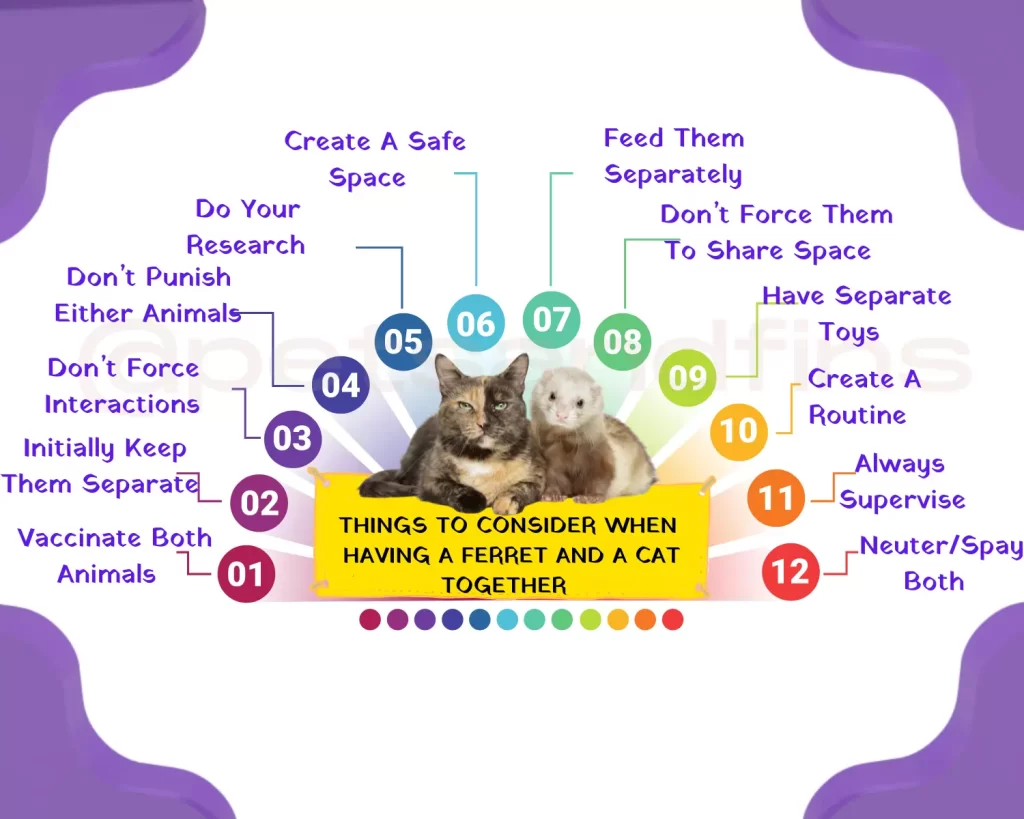
- Vaccinate Both Animals:Make sure the cat and the ferret are in good health and have all of their vaccinations up to date. This means that they’re less likely to carry diseases that could harm each other.
- Keep Them Seperated At First:Keep them separated at first by either closing off part of the house or setting up a large pet barrier between them (like one of those gates for dogs). Put both animals on leashes so you can keep an eye on what they’re doing without having to worry about them getting out of control.
- No Forced Interaction:Do not force interaction unless there’s no other choice; this will make both animals more stressed than normal and can lead to a negative experience for everyone involved.
- Do Not Punish Either Animal: If something bad happens, do not punish either animal; instead, focus on figuring out how to prevent the same thing from happening again in the future.
- Do Your Research: Before bringing a cat or a ferret into your home, spend as much time as possible learning about them.This way, you know what they like and dislike, which behaviors might be normal, etc.
- Create A Safe Space For Both Animals: These safe spaces should include separate places to hide, separate litter boxes (for both kittens and adult cats), separate water bowls, separate food dishes/treats, separate toys that each animal likes to play with, and anything else that you think they might need.
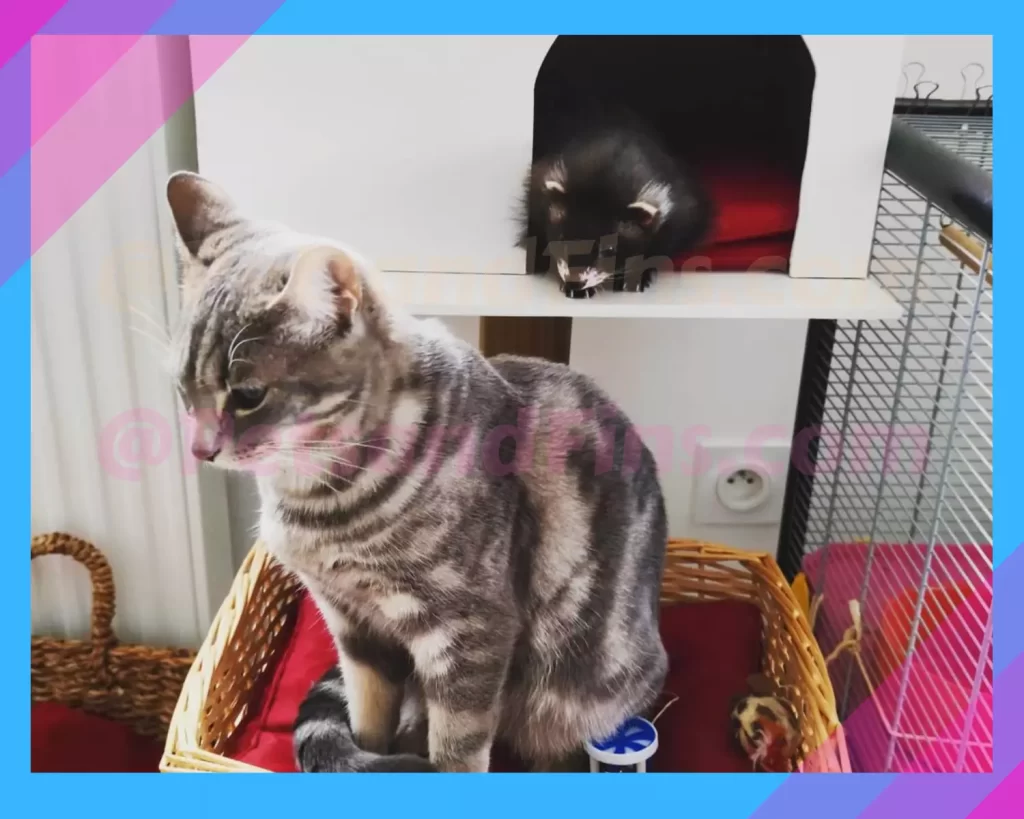
- Do Not Force Them To Share A Space: Do not force any animal to share a space with the other until they are comfortable doing so. If you do this, it could cause major issues for one or both animals, and trying to undo it after the fact will only make things worse!
- Feed Your Ferrets and Cats Separately: Do not feed your ferrets and cats in the same area because you do not want either animal to become aggressive and compete for the same food.
- Have Separate Toys: Do not leave any toys out where both animals can get to them, as this could lead to a fight. Instead, keep different toys in each animal’s safe space so they can play without interference from the other.
- Create A Routine: Having a routine for your cat and ferret will help make sure that everyone knows what is expected of them. This will help minimize fights and create an overall calmer environment for all the residents of the household.
- Monitor Their Interactions With One Another: Don’t forget that even if your cat doesn’t like ferrets (or vice versa), that does not mean they can never learn to get along – but there may be some trial and error involved before reaching that point. It all depends on how willing each animal is in terms of communication, understanding what makes them happy/unhappy, etc.)
- Neuter/Spay Both Animals: This is a must if you want to keep your pets safe and healthy!This will help reduce the chances of any fighting or territorial disputes that might occur.

Wrapping Up
Ferrets and cats can get along very well – as long as you take the time to slowly introduce them to one another! There are a lot of similarities between the two animals, which makes it more likely for them to get along once they become familiar with each other.
In most cases, ferrets and cats can get along well if introduced gradually. Always be sure to supervise the introduction. Cats may not appreciate a new furry friend in their home as much as you might hope, so it’s important to introduce them slowly and let them know that this newcomer is going to stick around for a while!
Ferrets are naturally inquisitive animals who love exploring new spaces. They will need plenty of toys and things to keep themselves entertained when left alone at home with your cat. It’s also important that both pets have separate food bowls, litter boxes, beds, etc.
If you have any deeper questions or concerns about these topics, please contact a veterinarian for more information!
I hope this article has provided you with some useful information that will help make it easier for everyone if/when you choose to bring a new feline friend or a ferret into the family. All animals are different, of course (just like people), but knowing what commonalities exist between cats and ferrets can go a long way towards helping keep everyone safe – including yourself!
XoXo
Genie

